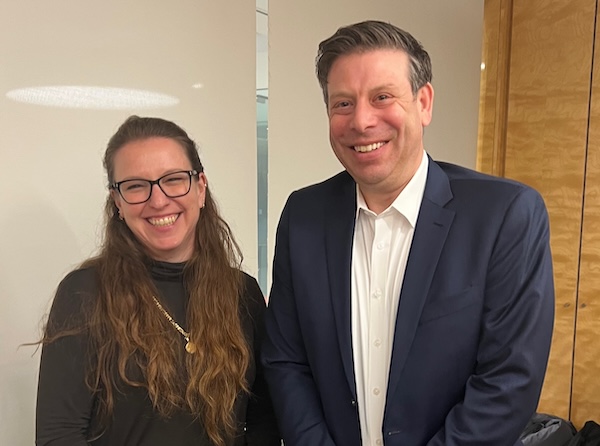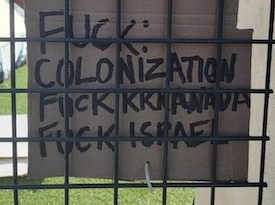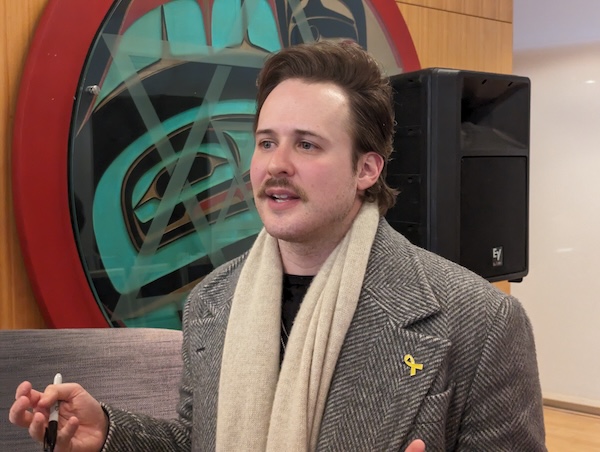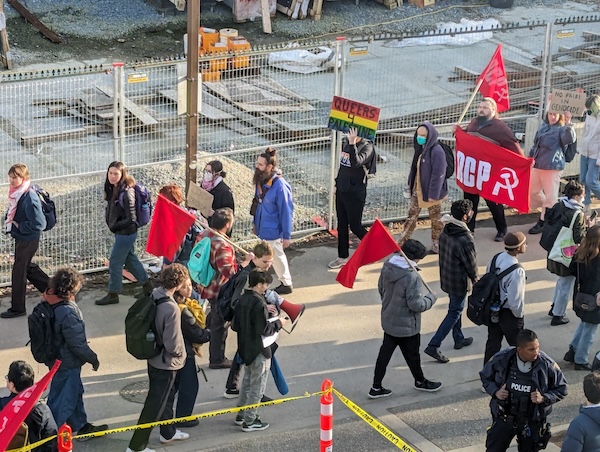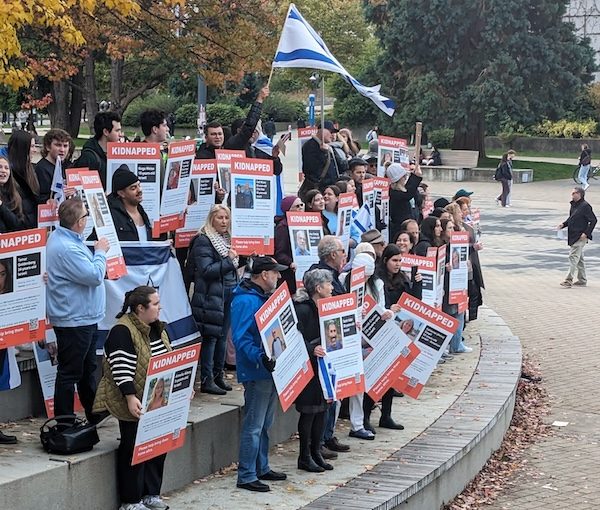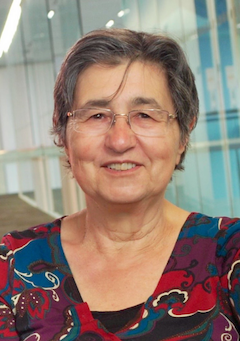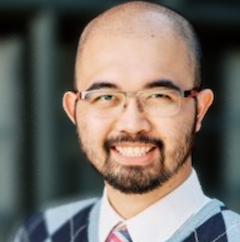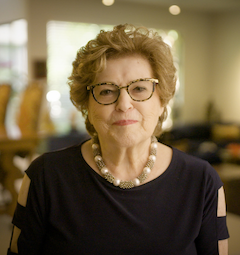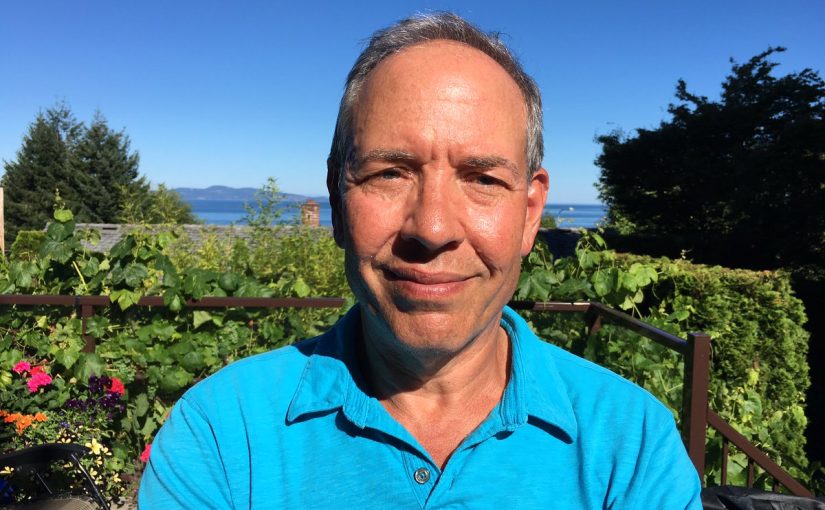Among the activities in which Hebrew University of Jerusalem’s Dr. Shiran Reichenberg, left, took part while she was in Vancouver was a lunch and learn at Lawson Lundell LLP, hosted by Peter Tolensky. (photo from CFHU Vancouver)
Dr. Shiran Reichenberg, executive director of the Hebrew University of Jerusalem law faculty’s Clinical Legal Education Centre, was in Vancouver recently, as part of a professorship exchange with the University of British Columbia.
The exchange program started in 2010, with funding from Canadian Friends of the Hebrew University of Jerusalem and members of the local legal profession and judiciary. From 2013 to 2019, it was named in honour of Mitchell Gropper, QC, and, since 2021, in recognition of the Koffman family’s financial support, it has been formally called the Morley Koffman Memorial Allard School of Law UBC and Hebrew University Law Faculty Professor Exchange Program.
Koffman was an alum of UBC law school in 1952. He practised at Freeman, Freeman, Silvers and Koffman, and was awarded Queen’s Counsel in 1986. His firm, Koffman Kalef, was established in 1993.
One of the founders of the exchange program was Bruce Cohen, whose career has included, among other things, almost three decades as a BC Supreme Court justice. In the CFHU and UBC announcements of the Koffman family’s donation, Cohen says, “Given the high level of respect and regard for Morley’s reputation in the legal, university, Jewish and general communities as a wise counsel and recognized leader it is perfectly appropriate for the program to be named in his honour as a reflection of the importance placed by him and his family on scholarship, professionalism and tikkun olam.”
On the CFHU website, Cohen notes, “The ability of the program to operate in the initial few years of its existence was due in large measure to Morley’s assistance.”
The CFHU Vancouver organizing committee for the exchange program consisted of Cohen, Sam Hanson, Peter Hotz, Shawn Lewis, Randy Milner, Phil Switzer, Peter Tolensky, Dina Wachtel and the late Allen Zysblat. The annual exchange even operated during the pandemic, albeit virtually.
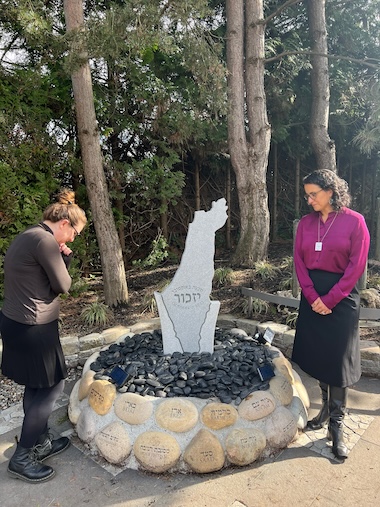
Reichenberg’s February-March visit to Vancouver was for just over two weeks, during which time she taught a course at UBC and spoke to various groups, including at Lawson Lundell LLP for a lunch and learn hosted by Peter Tolensky and at UBC’s Peter A. Allard School of Law, as well as at Temple Sholom for a lunch and learn organized by the Sisterhood, said Wachtel, vice-president, community affairs, at CFHU.
While Reichenberg regularly attends international conferences and lectures, this was her first time in Vancouver and, she said, “It was a very, very different experience to teach an intensive course for two weeks, each class three hours.”
Reichenberg, who is also the director of the Clinical Legal Education Centre’s Children and Youth Rights Clinic, said the course she gave here focused on the development of children’s rights and covered international documents, such as the Convention on the Rights of the Child, and other agreements, like the African Charter on Human and People’s Rights.
“We got very deep into several aspects of the convention and main principles, mainly best interest [of the child] and the right to participation. We talked about youth at risk, in criminal proceedings, in care proceedings,” she said.
Reichenberg graduated with her bachelor and her master of laws from the Hebrew University. She also studied in London, England, having received the Leonard Sainer Chevening Scholarship for LLM studies at University College London. She became interested in children’s rights law when she was a second-year student and participated in the Clinical Legal Education Centre’s Street Law Program, which is still part of the Children and Youth Rights Clinic she now directs.
“Each of us was put in a different residential care facility for youth at risk,” said Reichenberg, who was placed with a locked facility in Jerusalem. “When we entered this place and got an explanation about the girls and their life and what happened to them, it changed the course of my life. I stayed and I did another legal clinic in my third year of law school: representation of children’s rights, of children in court proceedings.”
In doing her PhD, Reichenberg focused on the right of youth at risk to participate in care proceedings, and her research included interviews with some of the girls from the Jerusalem care facility.
Children’s rights have their origin in labour law, Reichenberg said.
“Children, from the beginning of humanity until maybe the Industrial Revolution … died a lot, so parents didn’t get attached to them that much,” she explained. “And they were also considered as property of their parents, mostly their fathers, so they were sold, they were used to work, they were part of supporting the family; they weren’t what we consider them today. There is evidence that, in ancient times, children weren’t even given names, just numbers, because they died so much.”
But when children came to be working in mines and in factories, for example, “legislation gave them rights, to work only 12 hours a day and sleep at night, and things like that,” said Reichenberg, adding that the invention of the printing press, which meant that people needed to learn how to read, was an impetus for the establishment of schools.
The first child-related labour laws were English laws, passed in the early 1800s. The first youth court took place in the United States in 1874, and it involved the first case reported of child abuse, said Reichenberg. “[Mary Ellen McCormack] was abused by her stepmom and when the people wanted to help her, there was no law that protected children, so they used the law that protected animals from abuse.”
The Children and Youth Rights Clinic is one of nine offered by the Clinical Legal Education Centre. There are also clinics on climate change and environmental law; human rights in cyberspace; multiculturalism and diversity; representation of marginalized population groups; criminal justice; international human rights; the rights of people with disabilities; and wrongful convictions.
The centre can take a maximum of 140 students, with each clinic having, on average, 16 to 20 students.
“We have many more people who want to enrol than the places that we can give,” said Reichenberg, explaining that the clinics must be kept relatively small, given that they are working on legal cases.
“Each clinic is taught by a lawyer and there is a maximum number of cases that one person can handle, so we can’t have too many students,” she said. “Also, it allows us to have in-depth discussions in our classes with our students. And we always sit in a circle and there’s always dialogue, and it’s something that can be accomplished only in small groups.”
The Clinical Legal Education Centre takes a three-pronged approach. It handles upwards of 1,000 cases a year, providing legal aid and representation to individuals from marginalized groups. It also works for policy change, through test cases and position papers, for example, and offers public lectures and workshops to raise awareness, increase knowledge and promote discussion.
Since the Hamas terror attacks on Israel on Oct. 7, 2023, the centre has taken on an increased role in teaching and advocating for human rights. It has represented groups like the Hostages and Missing Families Forum in front of different United Nations bodies, for example, and has been operating Hamal Hevrati (War Room), a Facebook page providing legal aid to vulnerable populations, which has handled about 100 inquiries to date.
As well, the centre serves diverse clients and has a multicultural staff and student body, all of which include members of the Palestinian minority.
“We are not in war with the entire Palestinian people, we are in war with Hamas, and there is a difference,” said Reichenberg.
“So, we help those who need our help. And we work together, we study together,” she said.
It’s been hard, she admitted. “But we have to believe in working together and living together because none of us is going anywhere and we have to live together and work together for a long time … we have to find a way to do that and this is what we do.”
Reichenberg is proud of how the centre has adapted to the situation.
“In class, we have students who came from military reserves, still with their uniforms and their weapons. We have Arab students who have family in Gaza, which they haven’t heard from,” she said. “We have students who lost people they loved on the 7th of October and since. I personally have a student who I loved deeply and he died in the war, in his military reserve [service] in Gaza. And, also, in the staff, as I said, we’re a mixed staff and a lot of emotions came out on the 7th of October and we did a lot of preparation for staff, how to work with the students in this environment.”
While it’s not perfect, Reichenberg said, “it is certainly an amazing thing to see how everyone is sitting together, learning together, doing legal work together, for the same goal.”

